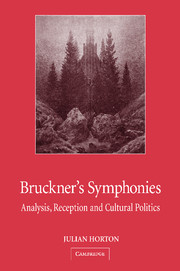Book contents
- Frontmatter
- Dedication
- Contents
- Preface
- 1 Introduction: the critical problem
- 2 Bruckner and late nineteenth-century Vienna: analysis and historical context
- 3 Right-wing cultural politics and the Nazi appropriation of Bruckner
- 4 Bruckner and musical analysis
- 5 Bruckner and the construction of musical influence
- 6 Analysis and the problem of the editions
- 7 Psychobiography and analysis
- 8 Epilogue: Bruckner and his contexts
- Bibliography
- Index
3 - Right-wing cultural politics and the Nazi appropriation of Bruckner
Published online by Cambridge University Press: 22 September 2009
- Frontmatter
- Dedication
- Contents
- Preface
- 1 Introduction: the critical problem
- 2 Bruckner and late nineteenth-century Vienna: analysis and historical context
- 3 Right-wing cultural politics and the Nazi appropriation of Bruckner
- 4 Bruckner and musical analysis
- 5 Bruckner and the construction of musical influence
- 6 Analysis and the problem of the editions
- 7 Psychobiography and analysis
- 8 Epilogue: Bruckner and his contexts
- Bibliography
- Index
Summary
Reception history
In June 1937, Joseph Goebbels addressed the assembled members of the International Bruckner Society, officials of the Reichsmusikkammer and high-ranking National Socialists, including Hitler himself, as part of the Regensburg Bruckner Festival. The speech effectively advanced an agenda for the appropriation of Bruckner's music, personality and biography as vehicles for Nazi cultural ideology and propaganda. Goebbels adeptly entwined biography, hermeneutics and politics in an effort to present Bruckner as an Aryan composer of the highest pedigree, and an icon of German culture. The composer's peasant origins and provincial education, apart from the influence of Viennese liberal intellectualism, were marshalled by Goebbels as evidence of racial and ideological purity. In consequence, Bruckner's music represented a cultural expression of the Nazi doctrine of blood and soil, the work of a ‘rustic genius’ whose pure Austrian lineage and close links with nature gave rise to an unsullied ‘German musical creativity’.
Inevitably, Goebbels associated critical hostility to Bruckner with the influence of Judaism. Bruckner's detractors, primarily Eduard Hanslick and the Brahmsian faction in Vienna, espoused ideologies that were un-German and complicit with the opposition of international Jewry. They valued superficial urban intellectualism over true education, the parasitic practice of art criticism (Kunstkritik) over any kind of genuine creativity, and dry formalism over the artistic ‘inner consistency’ (innere Folgerichtigkeit) discovered in Bruckner's music. With considerable ingenuity, Goebbels fashioned the evidence of Bruckner's life and the reception of his music into a microcosm of political ideology.
- Type
- Chapter
- Information
- Bruckner's SymphoniesAnalysis, Reception and Cultural Politics, pp. 64 - 91Publisher: Cambridge University PressPrint publication year: 2004



